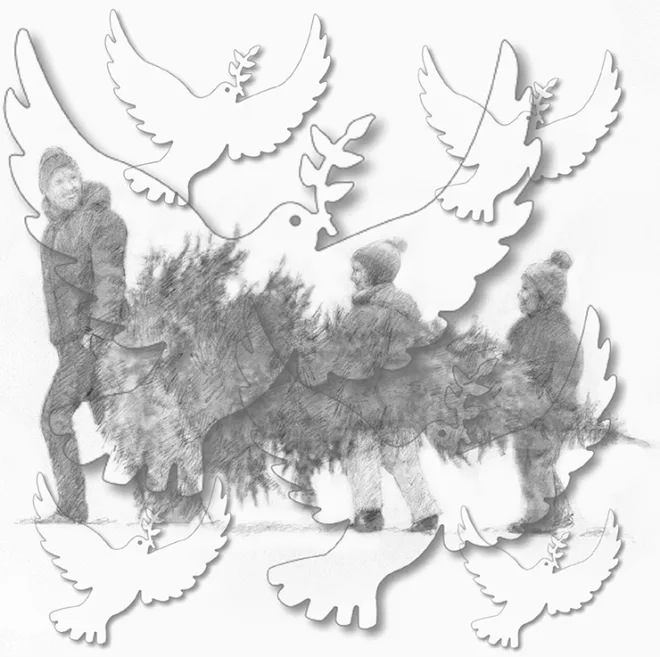
My dad ran a family farm on 70 acres in rural Ohio. He milked cows and grew and sold corn, soybeans, and alfalfa hay. It was a good life, but definitely a frugal one.
One year he planted a few red cedar trees to make a windbreak. Almost as a hobby, he started digging up the seedlings that sprouted each spring and transplanting them—until eventually he had a full grove of cedars.
When I was growing up, my favorite family tradition was the day, two weeks before Christmas, when we’d cut down our Christmas tree in that grove. Dad would lead the way, an axe in one hand and a ball of twine in the other. My mother, brother, and I always came along.
I’ll never forget the time I was eight years old—and a heavy blanket of snow fell the night before our planned outing. But the snow did not deter Dad! We all put on our snow gear and trudged out to the grove.
“Choose the tree you want, and I’ll chop it down,” Dad said.
I spotted one that had an abandoned bird nest tucked inside. “Let’s get this one!” I shouted. My six-year-old brother agreed. It was perfect—about six feet tall, with graceful branches and plenty of dark green foliage.
After Dad chopped the cedar down, he wrapped twine all around it, then tied the twine into a handle for carrying the tree. I looked at the bird nest in the middle of the branches and shivered with delight. I could just see my very own folded white paper dove sitting inside it. The four of us grabbed the twine handle and headed for home.
The sweet scent of cedar permeated the air, and my mind swirled with decoration ideas for the tree. I’d make red and green paper chains and white paper doves. We’d string popcorn and cranberries into garlands and hang gingerbread cookies with red ribbons. Dad would place the silver tin star on top and—a voice interrupted my thoughts.
“I want to buy one of your vintage Christmas trees.” We had reached our porch. A new neighbor was waiting for us. “I really like the cedar tree you have there.”
“I picked it,” I boasted. “It has a bird nest in it, too.”
“Sold!” the neighbor shouted.
Immediately, I regretted opening my mouth. My eyes began to tear.
I was so happy when Dad replied, “This tree isn’t for sale. Come, let’s go to the woods and get you another one.”
We all trekked back to the woods to help our neighbor find a tree. She, too, found one with an abandoned bird nest. I promised to make her a white paper dove for it.
Word got around about Dad’s “vintage” trees, and soon more and more folks came out to buy one. Dad led them all out to the grove to pick the tree of their choice.
On Christmas Eve morning, I woke up early and heard Mom and Dad talking softly in the kitchen. I got out of bed, tiptoed to the top of the stairs, and eavesdropped on their conversation.
“I’ve been trying to scrape together enough money for spring planting,” Dad said. “Because of the drought, our corn and soybean crops didn’t bring in much money this year.”
“You always find a way to get us through hard times,” Mom said.
“I didn’t know what to do this time,” Dad said. “Thank good-ness so many neighbors bought our cedar trees for Christmas. Now we have enough money for spring planting and money to pay for the children’s presents, as well.”
When I heard the news, a sense of joy washed over me. I dressed quickly, ran down the stairs, and joined them in the kitchen. But I didn’t say a word.
Mom clinked Dad’s mug of coffee, then started singing her very own original lyrics to “O, Tannenbaum:”
Oh, cedar tree, oh, cedar tree,
So fragrant and so fine.
Oh, cedar tree, oh, cedar tree,
Much lovelier than pine.
Their eyes twinkled as they smiled at each other. They had a secret.
I smiled, too. So did I. ❖


 Previous
Previous

